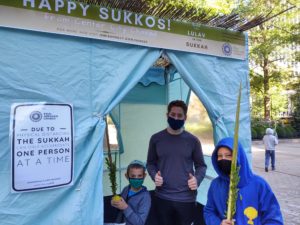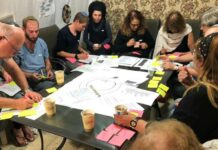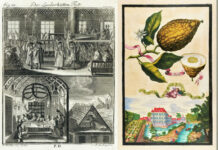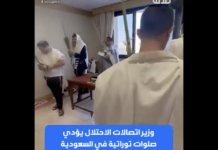
On Shabbat, one is told to light Shabbat candles 18 minutes before sundown, when Shabbat actually begins. It’s a liminal space between normal and different times.
“In some ways, the time we’re in is like that: We’re somewhat safe, but we’re somewhat not safe,” said Charles Schnur, who organizes the Sukkot map on the Jews in Center City Facebook page.
This year, fewer Jewish organizations and synagogues have shared their sukkah on the map than in pre-COVID years:
11 this year compared to 19 in 2019.
As Jewish organizations and synagogues contend with another year of COVID-19, albeit one that looks different than last year, the feeling of liminality between being COVID-free and COVID-conscious is reflected in Sukkot plans around the city.
Old City Jewish Arts Center is welcoming the public into its sukkah, just as it did last year, celebrating the theme of “we all belong,” both under the sukkah and in society.
OCJAC is continuing its tradition of filling the walls of the sukkah, located in front of the building by the sidewalk, with art from local artists and community members.
Planning on bringing back their Sushi and Simchat Torah event this year after skipping it last year — and hoping the sukkah will attract visitors interested in viewing the “11 Years in the Fringe” exhibit inside the building — OCJAC Rabbi Zalman Wircberg is all for fulfilling the mitzvah of inviting guests into his sukkah.
Open 24 hours, the OCJAC sukkah follows the city’s guidelines of social distancing and mask-wearing, hoping to ease some guests’ anxiety.
“This year, we’ll see more visitors who we haven’t seen because of the extra safety protocols,” Wircberg said.

Congregation Mikveh Israel also kept to its Sukkot traditions this year, feeling that hosting an outside event will mitigate COVID risks.
Spanning across nearly their entire parking lot, the Mikveh Israel sukkah is donned with real fruits hanging from the roof.
Just like last year, individuals and families will sign up for a time slot to eat and spend time under the sukkah. Families are seated together in their respective pods.
“Masks are mandatory; we put hand sanitizer everywhere,” Congregation Mikveh Israel Executive Director Shayna Golda said. “We try to keep people in their comfort zone.”
While these sukkahs endured during COVID to help recreate a sense of normalcy, the B’nai Abraham Chabad sukkah will host its first Sukkot celebration event in the sukkah in two years on Sept. 26 in Rittenhouse Square.
Last year, the Philadelphia Parks and Recreation Department was not giving out permits to host events in city parks. The Chabad could leave its sukkah up in the park, but couldn’t host gatherings. This year, the permit application process was nearly identical to years prior, giving B’nai Abraham the opportunity to make up for last year’s quiet holiday.
“We hope it’s as close as possible to ‘B.C.E.: Before-COVID era,’” Chabad Rabbi Yochonon Goldman said.
Though B’nai Abraham Chabad was able to successfully attain permits this year for its sukkah, the Center City Kehillah was not.
The Kehillah typically builds sukkahs and hosts Sukkot events in Julian Abel and Matthias Baldwin parks.
However, the Center City Kehillah’s new Executive Director Rebecca Krasner doesn’t take over the role until October, and her predecessor left the role in early summer.
Applying for park permits just wasn’t a priority this year, and Krasner felt she didn’t want the Kehillah to host Sukkot events without being able to properly coordinate COVID protocols for the holiday during this time of transition.
“We at the Center City Kehillah feel very strongly about keeping people safe during this time, and that extra added layer of coordination … wasn’t something that we were comfortable taking on this year,” Krasner said.
Instead, Krasner hopes Jewish community members will find another sukkah to visit that is open to the public.
But not all Jewish organizations feel comfortable making their sukkah open to the public.
Thomas Jefferson University Jewish Student Association has its sukkah open only to Jefferson students and staff.
The school’s policy dictates that only Jefferson students and staff have building access, and because the sukkah is located within a campus building’s atrium, only Jefferson community members are granted access.
Like others, the Jefferson JSA did not put up a sukkah last year, but wanted to prioritize the holiday this year.
“It’s one of the more important services that we provide,” JSA President Alex Straus said.
Last year, the Jewish community at Jefferson was disconnected, especially among newer medical students who had not attended the university prior to COVID. Straus hopes more in-person programming will help tighten the community.
“That’s another reason why we want to come back this year, have a sukkah and do some kind of event,” Straus said.
To find a sukkah open to the public, visit the Jews in Center City Facebook page.
[email protected]; 215-832-0741






